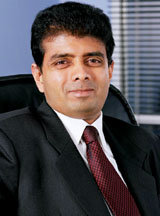|
observer |
|
|
|
|
|
OTHER LINKS |

|

|

|
No price war or supernormal profits in telecom industry - Dr. Hans Wijayasuriya
The telecommunication industry in Sri Lanka will reach maturity within the next two years in terms of demand as the number of subscribers reach eight million or the telephone penetration reach 40% of the population, said CEO of Dialog Telekom (DT) Dr. Hans Wijayasuriya. However, there is potential to increase this penetration level because in countries such as Malaysia the penetration level is as high as 60%. In developed countries it is over 90%, he said. Dr. Wijayasuriya said that the telecommunication sector of the country is on a sustainable growth path. Telecommunication sector development can be assessed by two parameters. Firstly, the penetration level or per capita telephone connections and secondly the technology platform utilisation in the country. With regard to the penetration level Sri Lanka is well ahead in the region. According to the per capita telephone penetration we are close to 25%. There are around four million mobile phones and the per capita mobile penetration is around 20%. The number of fixed lines is around 1.2 million. In technology, the mobile sector is very advanced and the third generation (3G) mobile operations have started. In the fixed line too the CDMA or wireless digital telephony penetration is strong. There is room for improvement in broad band fixed infrastructure. Investments for this sector should come from operators and there are eight operators today and most of them have foreign shareholders. There are large foreign investment flows into the sector which shows that foreign investors have confidence in growth. When we compare our position with the region, we are well ahead in terms of per capita penetration. But in broadband infrastructure, India and Pakistan are more advanced. Price warDr. Wijayasuriya said that there is no price war or supernormal profits in the telecom industry in the country. The telecom sector entered into a new phase with price competition as DT cut its tariffs sharply. He said that the price war is something everybody should avoid. There has been a general improvement in the efficiency and this is a result of the huge investment in the sector and now the economies of scale have started to come into play. There are four million mobile subscribers and in our case we have a very sizable portion of that and we have started to translate economies of scale to better value for money for the consumer. What we have seen is not a price war. I hope the price war doesn't come into the industry because it will reduce quality of the service. In such a situation operators provide service below the economic costs due to intense price competition. That price will not enable us to give a quality service. What you see today is not a price war and it is passing on the efficiency to the consumer, Dr. Wijayasuriya said. He said that DT cut tariffs as a result of a mix of technological advancement, economies of scale and the company getting into new markets. Our business philosophy has been to deliver our service to as many people as possible in terms of affordability and access. We always try to lower entry barriers in terms of price and make our service more accessible in terms of coverage. Hence it is not a price war. We have certain obligations to our shareholders and again to the public as a public quoted company, he said. Huge investmentsStill the industry absorbs huge investments as companies are attempting to sustain the growth and achieve national objectives. Therefore there is no supernormal profits in the industry. We have a national objective, 40% telephone penetration by 2009. It is a good national target and to achieve that the industry should grow at 40-50%. Therefore a lot of reinvestments are needed. Last year the DT profit was Rs. 7 billion and we re- invested Rs. 15 billion, more than double the profit. In developed countries there is no such growth because the penetration is above 90% and the network is not growing at this phase. Challenges and conditions change from country to country. Here you see companies investing more money than they are making. They get external funding through foreign shareholders and borrowing. Therefore I say there is no supernormal profits, he said. Economic developmentDr. Wijayasuriya said that the competition in the industry is very healthy and all players are very good competitors. DT, the fourth player entered the industry and is number one today. Increasing telephony penetration has a positive impact on socio-economic development. It directly contributes to economic growth. Mobile telephones contribute to economic development of lower income segments of the economy. Small traders, self-employed people benefit and have access to a telephone that helps them to generate more income. There is an overall positive impact on the rural economy and this has been proved in many countries as evidenced by World Bank reports. They have found that the access to mobile telephony or telephony in general have resulted in socio economic development in countries such as Bangladesh, India, China and in the African Continent. Sri Lanka has a very progressive regulatory regime. It is one reason for the steady growth in the industry and large foreign capital inflow to the industry. That is why we are achieving the desired milestones, he said. |









